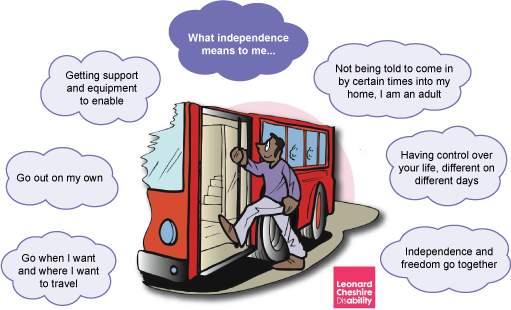2 Promoting independence
To promote independence means to support a person to reach their full potential and really do as much as they can for themselves.
This topic will help you to recognise that the concept of independence varies from person to person and to appreciate the impact independence can have on everyday life.
A valued life is one where a person is given respect, dignity and privacy and is supported to make their own choices about what happens to them. This topic will help you to understand this, so you can support the people you care for with a better awareness of the role positive risk-taking can play in helping them in gaining or retaining their independence.
The Care Act, which came into force in England in April 2015, replaced most of the current law regarding carers and people being cared for, and put new obligations on local authorities. One of these is a general duty to promote an individual’s well-being. This means that they should always have people’s well-being in mind when they make decisions about them or plan services. The term ‘well-being’ includes:
- personal dignity (including treatment of the individual with respect)
- physical and mental health and emotional well-being
- protection from abuse and neglect
- control by the individual over day-to-day life (including over care and support)
- participation in work, education, training or recreation
- social and economic well-being
- domestic, family and personal relationships
- suitability of living accommodation
- the individual’s contribution to society.
Local authorities have to consider the impact of your role as a carer on your well-being. Similarly, they have to consider the impact of a disabled person’s needs on their well-being.
In Wales, the Social Services and Well-being (Wales) Act 2014 came into force in April 2016. The definition of wellbeing is broadly the same as that covered in the Care Act in England.
Definition of well-being from the Social Services and Well-being (Wales) Act 2014:
- a.physical and mental health and emotional well-being
- b.protection from abuse and neglect
- c.education, training and recreation
- d.domestic, family and personal relationships.
But, unlike the English Care Act, it also covers certain aspects of legislation relating to children.
In a paper published by Scope, Our Support, Our Lives [Tip: hold Ctrl and click a link to open it in a new tab. (Hide tip)] (Davies, 2015), about the right to independent living, we are told that social care is about more than just the basics and must enable disabled people to live fully independent lives, putting them at the centre of their own care. This concept applies to anyone receiving care, not just people with disabilities, and Scope says that this is the key to being able to achieve the well-being principles outlined in the Care Act.
Whilst this report related to services in England, the principles of the report are also applicable to Wales.
This link from Disability Wales may also be useful:
http://www.disabilitywales.org/ social-model/ independent-living/
Activity 4
What does independence mean to you?
Think about this statement, and write a sentence below about what independence means to you.
Comment
Most definitions of independence say something like ‘the ability to live your life without being helped or influenced by other people’ (Cambridge Dictionaries online, 2016).
Now think about this:
If you lost your independence, what would you miss most?
Write down the three things you would miss most if you lost your independence.
Comment
When you answered the question you might have thought about what would affect you most by losing your independence and who else it would affect, e.g. husband/wife/mum/dad/other family members.
Do you think you would feel isolated, powerless, like a child or a baby again?
You may also have considered what you would miss doing the most. There are lots of everyday activities that we take for granted, like being able to get up and get ready for the day when we want or need to. Or being able to choose how we spend our leisure time.
Think about how the loss of independence could make someone feel, coupled with being separated or cut off from the rest of society – the effect could be devastating.

The quotes in Figure 1 are from a Customer Action Network meeting at Leonard Cheshire Disability when participants were asked what independence meant to them. These are things that most of us take completely for granted, but for people living with disabilities or other conditions that make them dependent on others, that is how they define independence.
Look at what someone with a significant disability can achieve with the right support. Ray De Grussa mastered using specialist computer software to achieve his ambition of composing music. He received an award at Adult Learners’ Week in 2012 but his real reward was that he was finally enabled to achieve his ambition.
